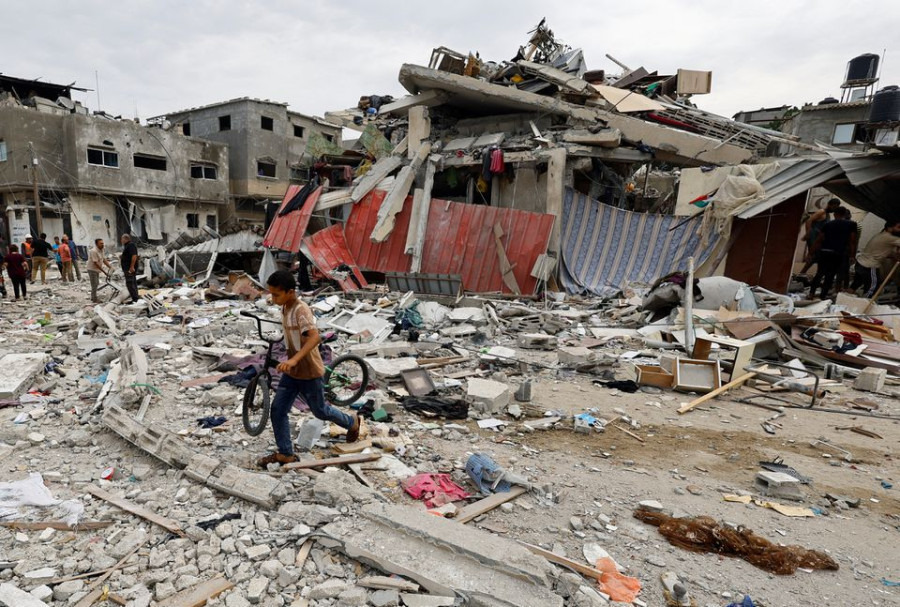Columns
Gaza inferno and beyond
The growing isolation of Israel in the international community has had little to no effect on its approach to the ongoing conflict.
Amrit Poudel
Rashid Khalidi, in his acclaimed work Hundred Years of War on Palestine, outlines the Zionist control over the statehood of Palestine, inter alia, initially through British imperialism and then by American hegemonic ambitions. The longest conflict of the 21st century has erupted into a full-fledged war, this time with Hamas at the forefront, fighting for Palestinian statehood. While Israel maintains military dominance over the occupied West Bank and Gaza Strip, recent events have shattered its image of having an unbreachable defense and a powerful, moral military. In this piece, we will examine the events that have unfolded since the armed incursion and their implications.
Following the Palestinian “intifadas” (uprisings) in 1987 and 2000 against Israeli occupation, Palestinians have continued their struggle through various means, including protests, boycotts, arts and theatres. Though these intifadas led to the signing of the Oslo Accords and Israeli disengagement from Gaza, respectively, they have not yielded significant results. Soon after, despite being considered a terrorist organisation by countries like the United States, Hamas secured a victory over the ruling party, Fatah, in the second Palestinian Legislative Election held in 2006. The rise of Hamas, driven by anti-Zionist and anti-imperialist ideologies, led to several Israeli raids in Gaza and the West Bank, resulting in the capture of senior leaders and the imposition of sanctions.
Fast forward to October 7, 2023, Hamas carried out an armed incursion (Operation Al-Aqsa Flood) from the Gaza Strip into Southern Israel and took Israeli hostages as leverage for the diplomatic efforts. While this event tarnished Israel's image of an unbreachable defense, the consequences of the event thereafter have proved fatal for the Palestinians. The Israeli military ordered an evacuation of 1.1 million Gazans living in the north of Gaza within 24 hours on October 13, which the Palestinians describe today as the “second Nakba (displacement)”. Armed by the US and its allies, Israel started its ground invasion in Gaza on October 27, followed by the indiscriminate bombing of hospitals and civilian infrastructure on account of eliminating Hamas.
However, the extreme measures taken by the Israeli government led by Netanyahu have proved catastrophic in a geopolitical context and are far from achieving its goal of eradicating Hamas. Moreover, the adventure has become an uphill battle for the Israelis and their allies.
Operation Al-Aqsa Flood, led by Hamas, though it reached the brink of instigating a full-blown regional conflict, diplomatic efforts have prevailed in avoiding this nightmare. However, Houthis in Yemen have joined the force of resistance by blocking the passage of the Red Sea for Israeli ships and its allies. The initiative of the US to hold Yemen responsible for its action, which involved the bombing of Yemeni military facilities along with the UK and the formation of a multinational force to protect trade in the Red Sea, has failed.
Additionally, the possibility of Hezbollah—a Lebanese political and military group led by Hassan Nasrallah, which has been very vocal in its support for the ongoing resistance by Hamas—joining the conflict full-fledged still lingers as Israel and Hezbollah continue to engage in frequent skirmishes on parts of Israel-Lebanon border, occupied Golan Heights and Syria. However, this would be a big blow to Netanyahu’s government, as Hezbollah is a far superior military group than Hamas.
Losing support at home and flexing its military prowess, Netanyahu’s government struck the Iranian Embassy Complex in Syria, killing 16 people, including eight members of the Iranian Revolutionary Guard Corps (IRGC) in April. Moreover, one can also interpret this attack as an Israeli frustration against the Iranian-backed resistance groups in the region (including Hamas, Hezbollah and other proxies) and an attempt to drag the US into a confrontation. This attack, condemned by numerous countries, proved fatal to the Israelis as Iran retaliated with missile and drone strikes on some of the Israeli military bases within its territory. The response by the Iranians to the unprecedented attack on its embassy sent a clear message to both the United States and the Israelis about its military arsenal and its readiness to retaliate against any escalation. This event not only exposed a gaping hole in Israel's defense but also etched Iran as a formidable power in the region.
Furthermore, the ongoing Israel-Hamas conflict has left inedible repercussions on Israel's standing in the global community. The harrowing images and videos coming out of the Gaza Strip have left the international governing body speechless and have led people to reason for Israel as a genocidal state.
Since the start of the conflict, the Palestinian death toll has exceeded 35,000, with 80,000 more injured. The repercussions of these events are sure to leave an indelible mark on Israel's image, as the International Criminal Court has sought legal action by issuing an arrest warrant against Prime Minister Netanyahu and Defence Minister Gallant. In a diplomatic fallout, Bolivia has severed all diplomatic ties with Israel, while Chile, Colombia, Jordan, Bahrain, Honduras, Turkey, Chad, South Africa and Belize have recalled their ambassadors.
Additionally, pro-Palestinian protests across US campuses, which later spread to Europe and other regions, have dealt a significant blow to Israel, both from the public relations and diplomatic perspective. To add to that, talks on a two-state solution have gained much more momentum in the international community, and recently, Norway, Ireland and Spain have announced their willingness to recognise Palestine.
However, the growing isolation of Israel in the international community has had little to no effect on its approach to the ongoing conflict. Days after the International Court of Justice (ICJ) ruling to stop the Rafah offensive, Israel conducted an air strike, which left hundreds of civilians dead, including children.
The silence of Western countries at a time when humanity is at stake is both tragic and horrifying. In contrast, to show strong support for the Israeli government, Speaker of the United States House of Representatives Mike Johnson recently invited Netanyahu to speak in the US Congress. It is likely to undermine US diplomacy and its credibility as a peacekeeper across the globe in the future as it facilitates Israel's conduct of a war that’s been argued to be a “genocide”.




 16.12°C Kathmandu
16.12°C Kathmandu















